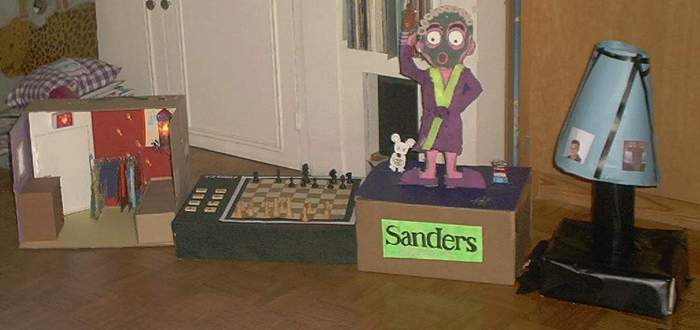SURPRISE - 2 (8 january 2006)
On the celebration of St Nicholas (5 December), the Dutch customarily give each other presents which are often accompanied by rhymes and so-called surprises (click). These surprises are home-made contraptions which symbolize something connected with the receiver (or victim).
Just to give a general impression: the picture below shows the surprises the members of my family made for each other on St Nicholas celebration two years ago:

As you can see, one of the surprises was a chess computer made of cardboard. Bearing in mind that I'm a keen chess computer collector, you may try to guess which family member the latter surprise was meant for. You can read more about this quaint Dutch custom in this weblog.
But why do I mention these 5 December surprises?
Not primarily because I wrote a weblog named "Surprise" (click) on 5 December.
No, it's because of an article I read in the December issue of Dutch chess computer magazine Computerschaak. This article was written by Cock De Gorter, a Dutchman who has won his spurs by assembling the opening libraries for several chess computer programs. The article was entitled 5 December Surprise.
De Gorter describes how he often visits the Playchess server. On the night of 5 December he sees a chess program called Rybka written by Hungarian Vaclav Gerard Rajlich. Cock expresses his surprise about the fact that Rybka evaluates about 50,00 positions per second, which is slow compared to the one million positions evaluated by Fritz in the same time.
But the games played by Rybka are a quite different from what the speed might suggest: in a brilliant, almost human style. Rybka beats one program after another.
But don't they say one game can say more than a thousand words ? So have a look at the game below and see for yourself how Deep Fritz 8 is beaten by Rybka 1.0 beta in a way that would be worthy of the magician from Riga, Michael Tal.
White: Rybka 1.0 beta Black: Deep Fritz 8
After seeing this game, will you still believe computers play boring chess?